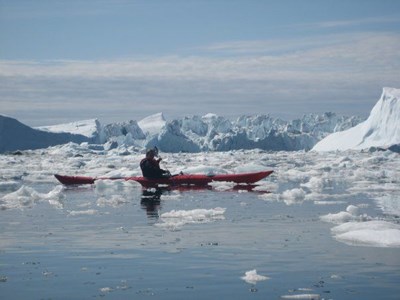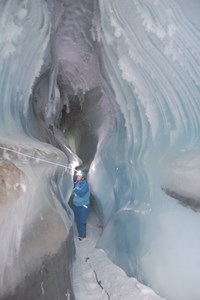In 2005 I finished college and worked as a pedagogue (a Danish mix of social worker and kindergarten teacher) in the Copenhagen area. In 2006 I decided to apply for a job in Greenland because I had always wanted to see Greenland and liked the challenges I could get there professionally. So, on the 1st of April 2006 I moved to the capital of Greenland, Nuuk, to work at an orphanage. I loved living there! It’s a beautiful place: during summertime your eyes catch jumping whales in the fjord, and during wintertime the sky becomes magical with northern lights embracing it with a green haze.
Many Danes try their luck in Greenland, which is easy because many Greenlanders (especially in Nuuk) understand and speak Danish. Unfortunately, many also move there only to experience Greenland and the amazing nature, and end up staying there less than two years. This makes it very difficult for the locals to bond with newcomers, since they know that they’ll probably disappear again. Therefore, in Nuuk, it kind of felt like two parallel societies: one for the locals and one for the foreigners. Unfortunately, I was to reproduce this pattern and left only six months later. But even though my stay was very short, it made a huge impact on me and my future life. Now, seven years later, I still stay in touch with my Nuuk friends, I visit them when I am in Greenland, and they visit me.

After a few months I had this strong urge to go back to Greenland. In September 2007, I began studying anthropology at the University of Copenhagen, and during the first semester I found an article about a job as a tour operator in Ilulissat, Greenland. I applied for the job and got it. The summer of 2008 was my first summer as a tourist guide for World of Greenland. I would spend my days hiking with tourists, doing helicopter rides above glaciers, and doing whale watching and midnight cruises among the huge icebergs under the midnight sun. As the years went by I slowly did less and less guiding and instead more and more administrative work in the office until 2011, my last year working for World of Greenland.
I spent the fall of 2009 as a Nordplus/Nordlys exchange student at the University of Lapland doing the Arctic Studies Program. Rovaniemi was a wonderful place to stay and it was amazing finally to be able to concentrate solely on my main interest: the Arctic. We were a group of ten exchange students doing most things together. I took the reindeer class which was fun, and some classes of northern people and mobility by Florian Stammler. I also did the field trip to the Kola Peninsula. It was amazing to experience this foreign part of the world and be taught by people with great knowledge.
Then, in 2010, I started in the grad school of anthropology at the University of Greenland and had to plan a four-month field work for my Master’s thesis. Of course, I wanted it to be somewhere up north. I ended up going to Longyearbyen on the Norwegian archipelago Svalbard, 78 degrees north. There I wanted to study how migrants, especially from Scandinavia, feel at home on Svalbard even though they know that they are only going to stay there for a short period of time. Svalbard is legally a weird place. Everybody can go there without a work permit, but foreigners outside Schengen cannot go to Norway from Svalbard because they need a different permit. Alcohol and tobacco are duty free even though it is a part of Norway. You are only allowed to live on Svalbard if you have a job there. Babies cannot be born in Svalbard, and people cannot get buried there, because the Norwegian Government wants it to remain a place of only temporary living. Some people stay there for a decade or two, but most people are there for less than two years. This feeling of temporariness makes it very easy to meet people because you are never the only newcomer, and people do not mind that you will not be staying very long because neither will they. When I arrived in the beginning of February 2011, it was minus 25 degrees, dark all day long and blessed with northern lights. When I left in the middle of May, almost all snow and ice had disappeared, it was plus 10 degrees and the midnight sun had arrived. Besides the 2,000 people living on the island of Svalbard, there are 3,000 polar bears. On two different trips to the east coast I got to see a mother with her two small babies that had just left hibernation, which I will never forget. On Svalbard I met the most amazing people, and I cannot wait to go back.

The summer of 2012 was the first time since 2006 that I was not able to move somewhere up north for some time because I had to finish my Master’s thesis, and on the 24th of August I became an anthropologist. I knew it would be difficult to get a job, and even more difficult to get a job with anthropological tasks, and that I would probably not be able to get a job that would combine work with my interest in the Arctic. But in January 2013 I started working for the Association Greenlandic Children as a project coordinator, and here I am, creating new projects that will help Greenlandic children. Our main goal is to get more Greenlandic youth to enroll on education, but we also aspire to decrease the number of children who are subjects to neglect and abuse. I was only supposed to work here until the first of July, but it just got prolonged for the rest of the year. This is my dream job, and there is no doubt that I got this job because I followed my huge interest in the Arctic and the people living there. I feel very lucky that I am able to combine my anthropological skills with my passion for the Arctic!
All of these experiences abroad have been amazing, and I know for sure that they will be sculpting my future career. I do not know anyone else who did their exchange to other northern countries. Unfortunately, I think many Danish students choose to go to English-speaking countries to improve their English skills. I think the University of Copenhagen should draw more attention to the possibilities in other northern countries. Especially Danes, Swedes and Norwegians are blessed to be able to speak almost the same language, which makes it easy for us to go study or work in the other Nordic countries. And for people like me who have this huge Arctic interest, Finland, Greenland and Iceland are also very attractive. Mobility is the way most people live now, and for me mobility is also the way I think, because I know that out there… great experiences await.
Published in 2013.
